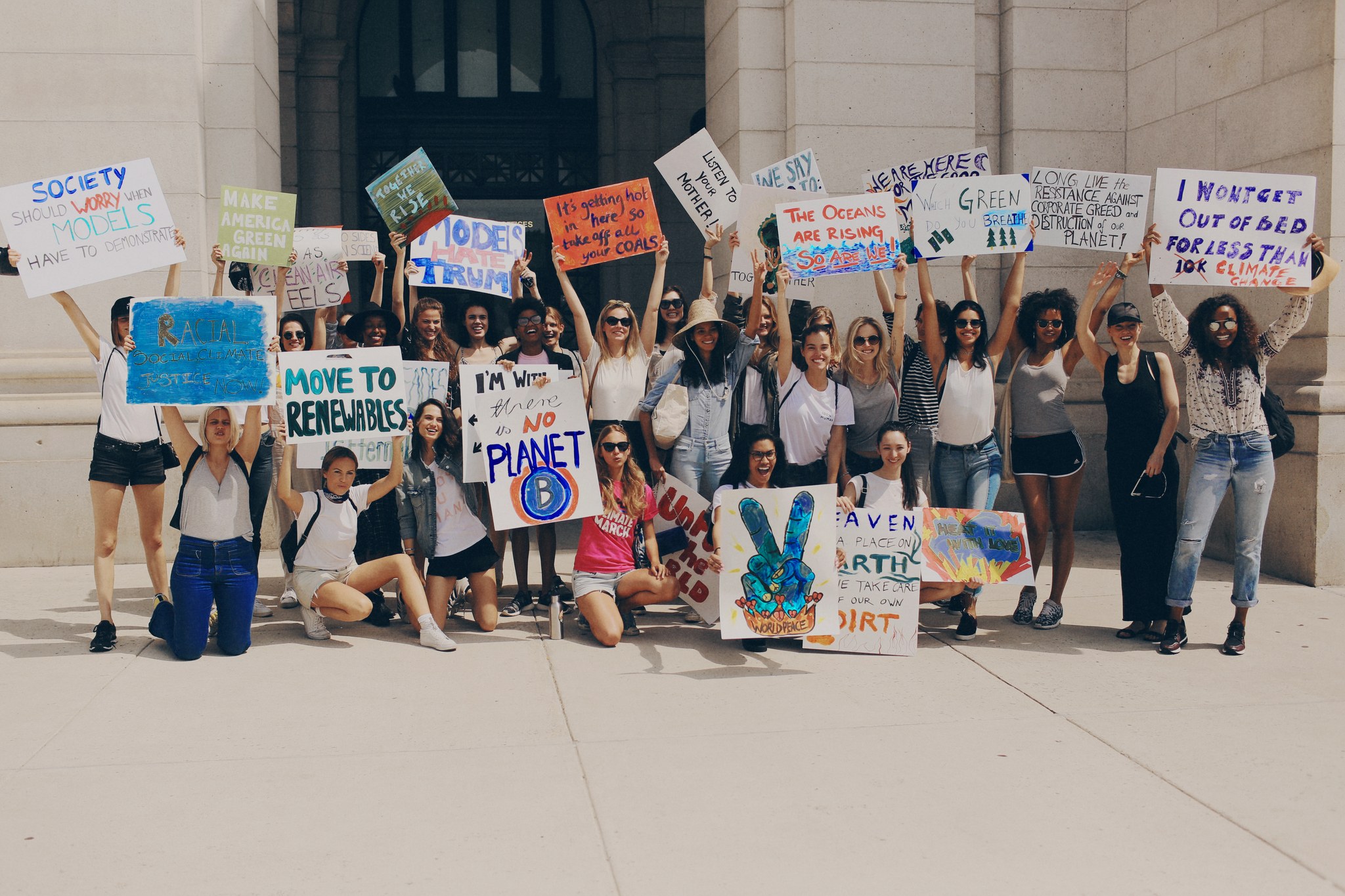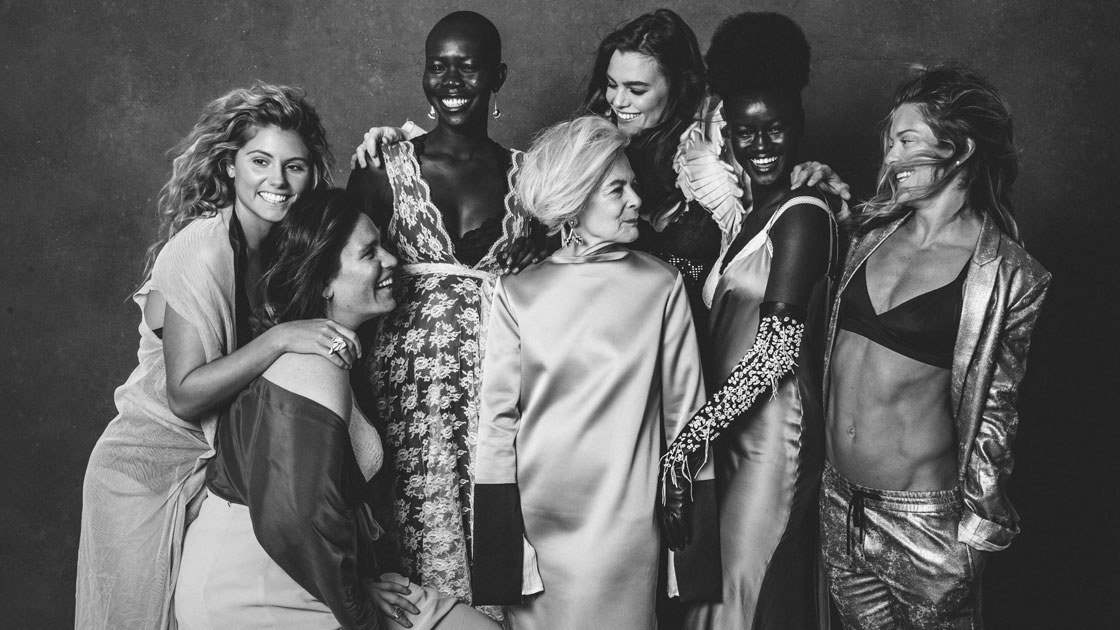Photo: Gabrielle Celeste for glamour.com
As the faces of an industry often accused of objectifying rather than empowering women, models seem like the least likely activists and social leaders. But having such high visibility means having a platform to promote female empowerment and a host of social causes. Here we look at some of the women changing how we define a model citizen, and the organizations, online communities and coalitions they have founded.
Adwoa Aboah speaking at the Coach x Gurls Talk Festival / Photo: youtube.com
Adwoa Aboah - Gurls Talk
Despite an arsenal of editorials and high profile runways on her resume, Adwoa Aboah hasn’t always had the confidence that’s presumed to come with being a frequent covergirl. Growing up and into the early years of her career, Aboah struggled with a harrowing addiction and depression that culminated in a 2014 suicide attempt. While recovering, she attended a meeting in west London that was, coincidentally, all female."I suddenly realized that I wasn't on my own," Aboah told i-D magazine. "It made me think how beneficial it would be to just get girls talking." In an effort to create a similar community online, Aboah launched Gurls Talk on Instagram, as a digital forum wherewomen could go to talk about sexuality, mental health and addiction, without judgment or reservation. What started as a safe space is now a movement. Most recently, Aboah partnered with Dazed magazine for Gurls Talk x Coach, a one-day festival replete with women-led workshops, panels and spoken-word readings promoting self-care.
Karlie Kloss with a Kode with Klossy Camp Graduate / Photo: facebook.com/kodewithklossy
Karlie Kloss - Kode with Klossy
Perhaps no face has been more pervasive in print and online over the last nine years than that of Karlie Kloss. And with such unparalleled fame in fashion comes a platform, one Kloss is using to teach young girls and women to code. “Women today make up 18 percent of all computer science graduates,” Kloss has said. “That’s not enough.” After wanting to find out how apps like Instagram worked, Kloss signed up for a coding class at New York’s Flatiron School. This introduction to the field inspired her to found Kode with Klossy in 2014, to empower girls and women to pursue computer science careers and remove the STEM field stigma. Today, girls 13 to 18 years of age can participate in a two week coding summer program, and each month a woman pursuing a career in code is awarded a career scholarship. This summer alone, Kode with Klossy camps appeared in seven major cities and are on their way to New Orleans, Atlanta and Miami this fall.
Model Mafia at the People's Climate March / Photo: cameron-russell.com
Cameron Russell - Model Mafia
Before her viral TED talk addressing the fashion industry’s manipulation of body image and beauty, as well as its legacy of gender and racial bias, Cameron Russell was known as a pretty face with a 15-plus year career. This one-dimensional view is what she’s trying to address with Model Mafia, a collective of model activists championing a more sustainable, inclusive industry. But their influence isn’t limited to fashion. From climate change to immigration reform, Russell and fellow Model Activists come together to create conversations or participate in global movements, including the post-election and politically charged Women’s March and the People’s Climate March in May. More than 30 models caravanned to Washington, D.C. to promote racial and climate justice. A lead organizer of Model Mafia, Russell also acts as an advisor to Hollaback, Design Studio for Social Intervention, Bitch Magazine, Art & Abolition, an is an ambassador for the Rainforest Alliance and a UN advocate for the Women and Trade Programme at the International Trade Commission.
All Woman Project's "Everyday Heroes" / Photo: vogue.com
Charli Howard and Clémentine Desseaux - All Woman Project
In a similar pushback against the fashion industry’s body image standards and lack of diversity, Charli Howard and Clémentine Desseaux’s All Woman Project promotes unretouched images of women to help society rethink what being beautiful really means. Using the hashtag #iamallwoman, women and girls share what they love most about themselves via social media in an effort to remove the stigma surrounding female flaws, from stretch marks to skin color. With an ad campaign running the gamut of female body types, Howard and Desseaux launched the All Woman Project in 2016. In explaining the concept behind it, the founders told i-D, “We traditionally associate plus-size girls with terms like ‘curvy’ and ‘real women’, and straight-size models as ‘high fashion’ and ‘editorial’, missing out a vital fact – we’re all women, and should be treated as such.” For their second campaign, the All Woman Project partnered with intimates brand Aerie, itself long a pioneer for unretouched imagery. The second series of images featured a spectrum of women with various ages, sizes and skin colors. Not limited to models, the campaign highlighted “everyday heroes,” including 64-year-old fashion blogger Lyn Slater and trainer Holly Rilinger.
Leomie Anderson modelling LAPP the Brand / Photo: teenvogue.com
Leomie Anderson - LAPP the Brand
For conversations on everything from intersectional feminism to fashion, look no further than Leomie Anderson’s LAPP the Brand, a blog and clothing line. A relatively new face on the runway, Anderson walked in the Victoria Secret Fashion Show and in a handful of prominent AW17 collections, but the model found her footing online. Using Instagram to amplify her thoughts on the current administration, Anderson launched LAPP in 2016. An acronym for “Leomie Anderson the Project the Purpose”, LAPP combats the pressures young women face and to participate in the global political conversation. The brand went viral after Rihanna wore her “This P***y Grabs Back” sweatshirt to New York’s Women’s March. Since then, Anderson has launched a handful of capsule collections and an accompanying site with curated content by and for females and female-identifying individuals. The Consent Capsule collection was the brand’s first,and explored the right to say no, while LAPP’s latest, the Nuditee collection, rethinks social standards surrounding the female form.







